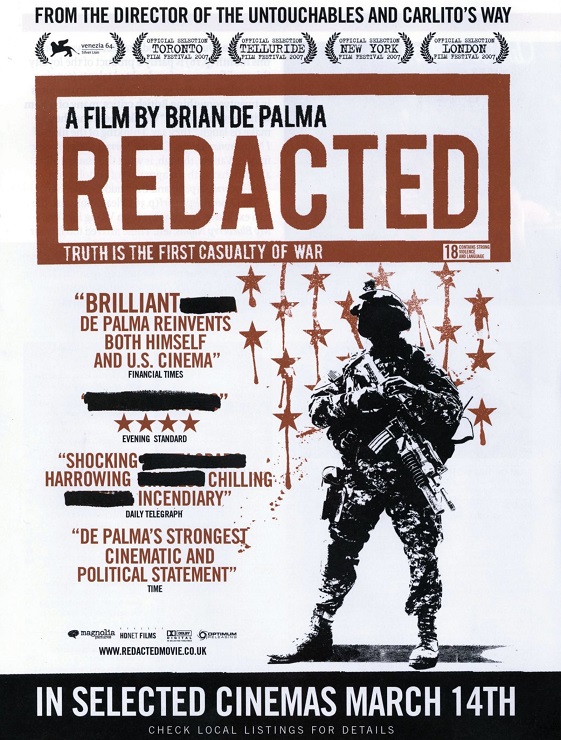
 Hello and welcome to the unofficial Brian De Palma website. Here is the latest news: |
|---|
E-mail
Geoffsongs@aol.com
-------------
Recent Headlines
a la Mod:
Listen to
Donaggio's full score
for Domino online
De Palma/Lehman
rapport at work
in Snakes
De Palma/Lehman
next novel is Terry
De Palma developing
Catch And Kill,
"a horror movie
based on real things
that have happened
in the news"
Supercut video
of De Palma's films
edited by Carl Rodrigue
Washington Post
review of Keesey book
-------------
Exclusive Passion
Interviews:
Brian De Palma
Karoline Herfurth
Leila Rozario
------------
------------
| « | March 2023 | » | ||||
| S | M | T | W | T | F | S |
| 1 | 2 | 3 | 4 | |||
| 5 | 6 | 7 | 8 | 9 | 10 | 11 |
| 12 | 13 | 14 | 15 | 16 | 17 | 18 |
| 19 | 20 | 21 | 22 | 23 | 24 | 25 |
| 26 | 27 | 28 | 29 | 30 | 31 | |
De Palma interviewed
in Paris 2002
De Palma discusses
The Black Dahlia 2006

Enthusiasms...
Alfred Hitchcock
The Master Of Suspense
Sergio Leone
and the Infield
Fly Rule
The Filmmaker Who
Came In From The Cold
Jim Emerson on
Greetings & Hi, Mom!
Scarface: Make Way
For The Bad Guy
Deborah Shelton
Official Web Site
Welcome to the
Offices of Death Records
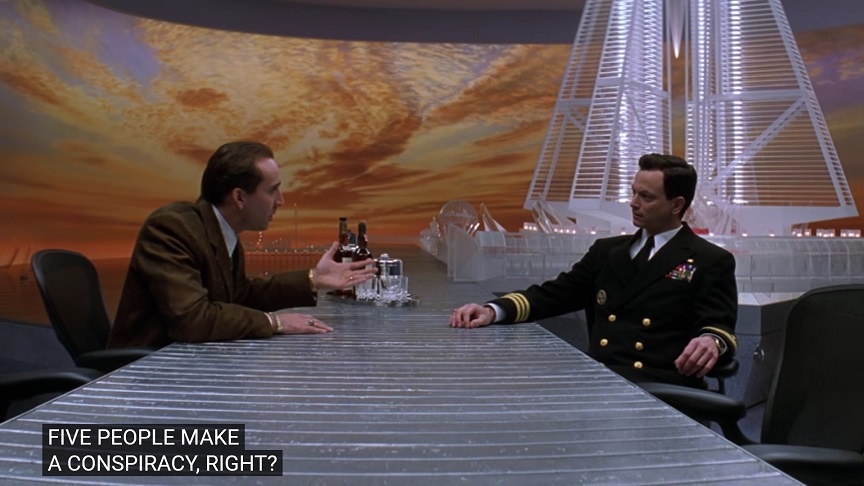
One movie that doesn’t quite get the love it deserves in this regard is Snake Eyes, in which Cage goes fully wacky for the legendary director Brian De Palma. Ask your average film-lover what their favorite De Palma movie happens to be, and we doubt very many people would say Snake Eyes. You’re more likely to get an intersection of answers that encompasses one or more of the following: Carrie, Scarface, The Untouchables, etc. While we would never claim Snake Eyes to be Top 5 De Palma, watching the movie against the backdrop of today’s weightlessly anemic mainstream thrillers makes it much easier to appreciate Snake Eyes’ formal inventiveness, the heedless zeal of its filmmaking style, and Cage’s hellacious, go-for-broke lead performance.The fact that Snake Eyes doesn’t labor under the pretense of being high art, ironically, is ultimately made it easier for critics to attack it. In his slam of a review, Roger Ebert called Snake Eyes “the worst kind of bad film: the kind that gets you all worked up and then lets you down, instead of just being lousy from the first shot.” Elsewhere, Kenneth Turan, writing for the Los Angeles Times, labeled the movie “coarse and undernourished” as an exercise in drama.
Of course, reviews are meant to be taken within the context of the time in which they were published. We have seen many instances of poorly-reviewed films that would go on to be reappraised as good or even great in the years/decades following their release (Richard Kelly’s infamously maligned Southland Tales is only one of a few examples of this). Snake Eyes isn’t a reinvention of the wheel, or even of De Palma’s usual playbook: as usual, he is doing Hitchcock one better, reveling in the suspense and skeeziness and explosive visual fireworks that this genre affords its practitioners.
Like the John Travolta-starring Blow Out — arguably De Palma’s masterpiece, at least in this writer’s opinion — the plot of Snake Eyes orbits around an instance of suspicious malfeasance that then spiderwebs into a veritable conspiracy of corruption. Cage struts up a storm, holding every inch of our attention as spectacularly flashy Atlantic City cop Rick Santoro. Rick is introduced in the film’s bravura opening sequence: a long, and we do mean long Steadicam take that follows Rick throughout every inch of a cacophonous boxing arena before that evening's big event. Cage reads his lines in an operatic, knowingly ludicrous register — the unbroken virtuosity of the camerawork seems to be communicating the sentiment that this is merely Rick Santoro’s world, and we’re just lucky to be living in. Though multiple viewings reveal that, by detailing every nook and cranny of his only real principal location, De Palma is laying out narrative clues in plain sight.
The crowd is fired up, the place is alive with bloodlust... sounds like a nice night for an assassination with a side dish of collusion, no? Cover-ups and double-crosses become the name of the game in Snake Eyes after an unseen gunman proceeds to shoot and kill the U.S. Defense Secretary amidst the high-stakes throes of the boxing match. Already, the setup for a thriller of this sort is delicious, but De Palma has more than one surprise up his sleeve.
Several other key figures factor into the ensuing mystery: a shadowy Naval official (Gary Sinise) whose intentions are not what they seem, a femme fatale (Carla Gugino) who witnessed the attack, and Truck Turner actor Stan Shaw as a heavyweight fighter with a face straight out of a '40s noir. Much of Snake Eyes, particularly with its labyrinth of a plot and the world-weary cynicism of Cage’s seen-it-all antihero, feels like De Palma’s fevered version of a contemporary film noir, though the Obsession director ultimately made a more traditional noir exercise with his undervalued, admittedly quite sordid 2006 vehicle, The Black Dahlia. The craft on display in Snake Eyes is nothing less than arresting: deftly sophisticated visual storytelling like the kind De Palma provides in even his lesser-praised work is virtually nonexistent in our current movie-going climate, which make the retrospective pleasures of something like this slept-on thriller all the easier to appreciate.

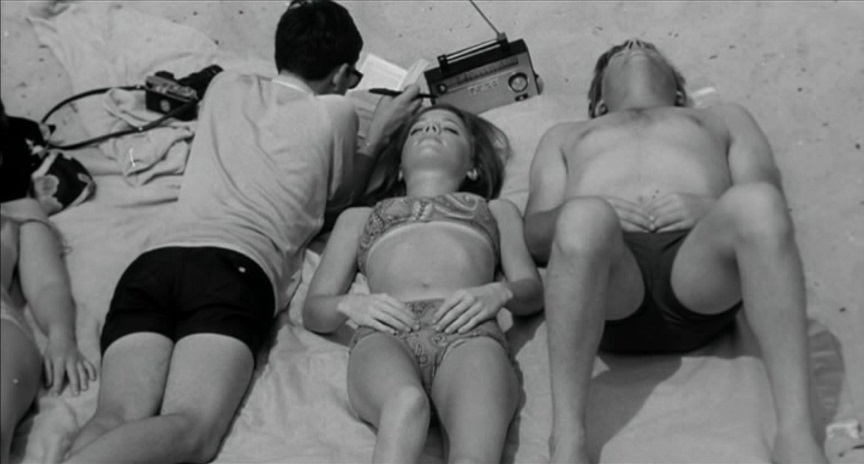
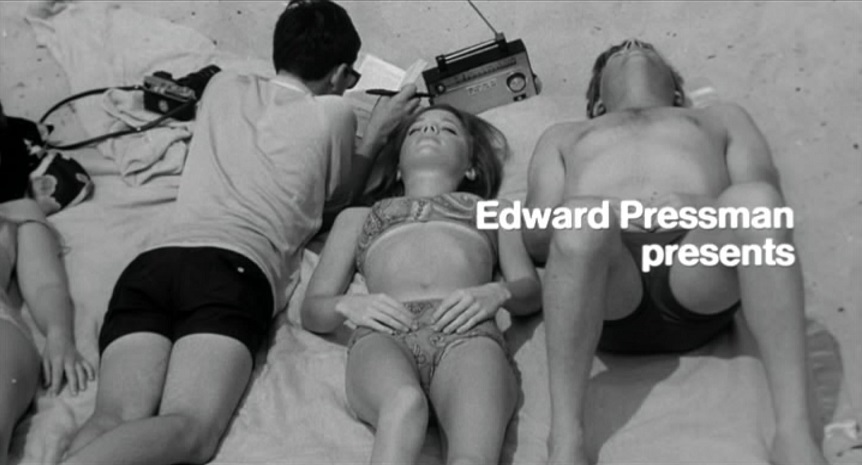

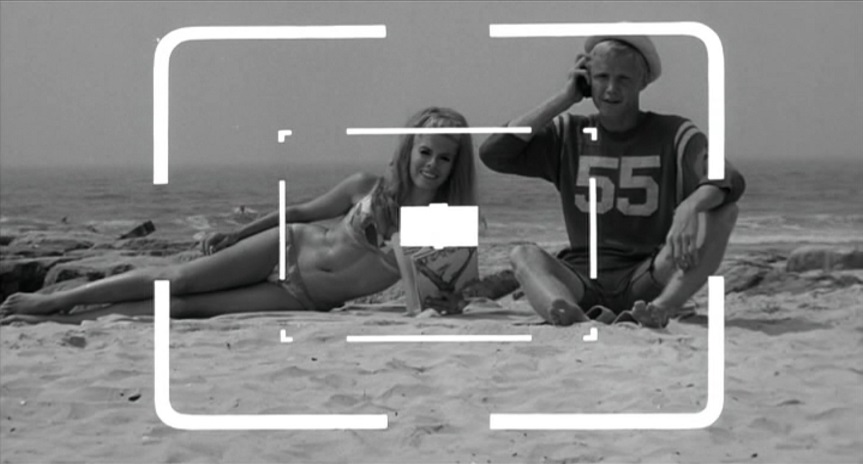
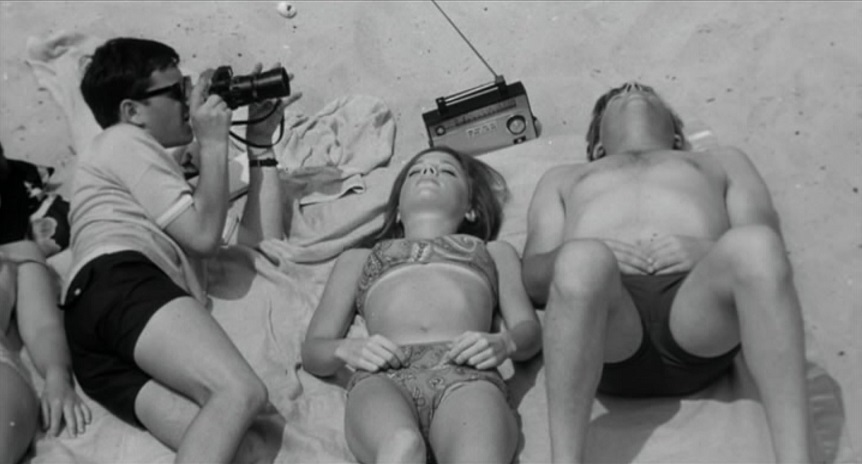
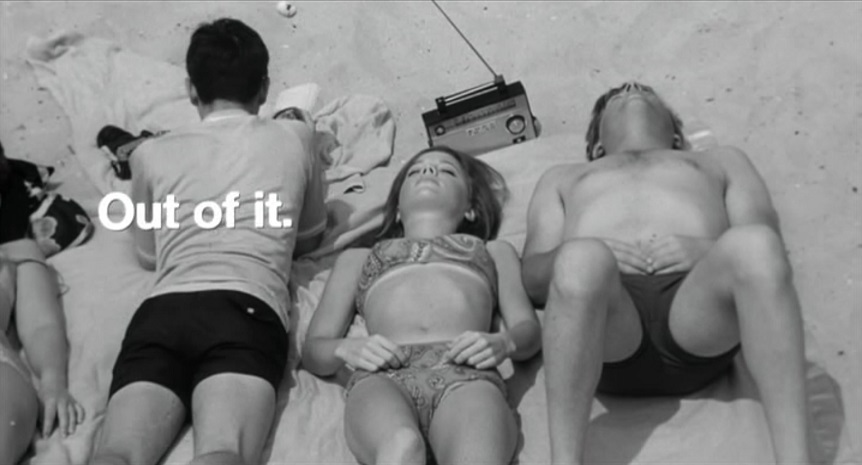
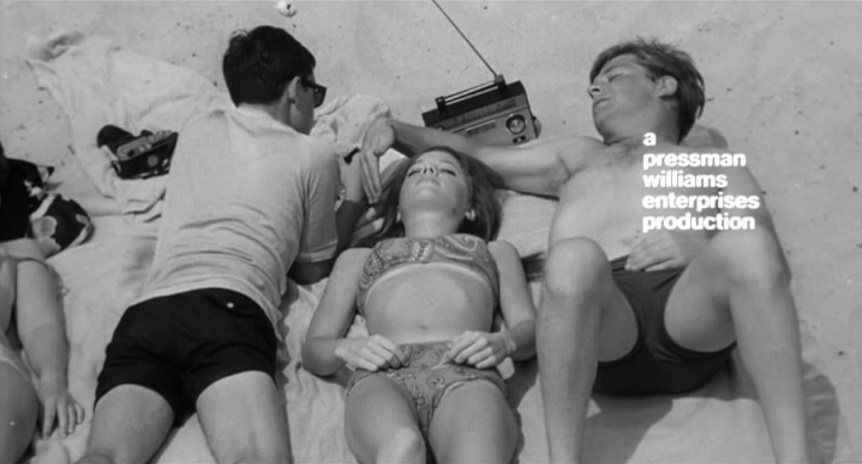

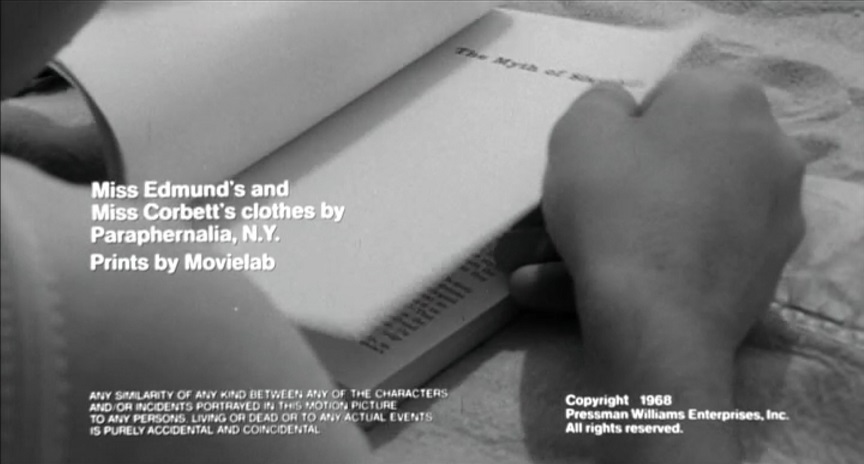
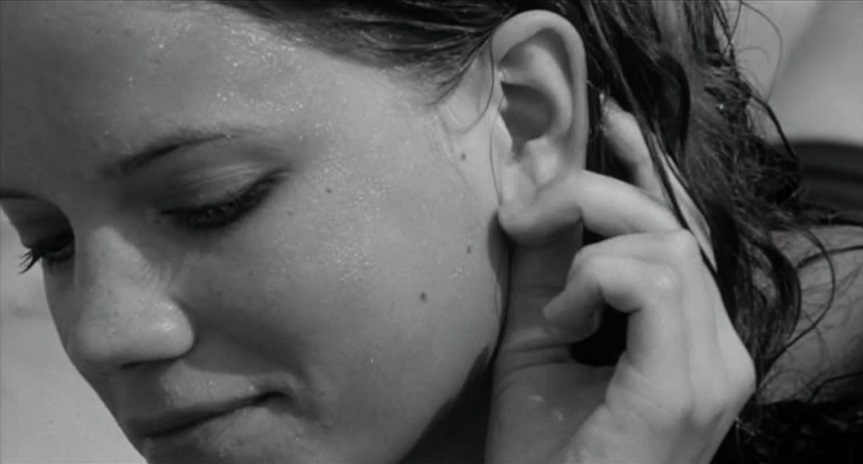
Paul Williams, from the 1973 book Directors In Action, edited by Bob Thomas:
In college I did still photography and made three short films, and wrote dozens of earnest film reviews for the school newspaper. The next year I went to England and met Edward Pressman, a young producer and philosopher. We made a short together which eventually won a Golden Eagle, which gave us the unjustified confidence to embark on our first feature film. I wrote it, Ed titled it: The Man Who Killed Men. Budgeted at five million dollars, TMWKM (as it became known) interested United Artists, but since we insisted on my directing and would not consider selling the property, United Artists explained that they couldn't have a twenty-one-year-old direct a picture of that size. I think it was Chris Mankiewicz who suggested, "Try something smaller, first."Since we didn't want to waste potential production money on a script, we decided that I should write an original. I think I wrote a simple but honest semiautobiographi- cal script about a sensitive kid in high school who never got laid. We called the movie Out of It and it took us seven months to find out that no major or minor or schlock company would finance a first feature film (a) based on a "plotless" original script about kids; (b) which called for and would use no stars; (c) to be directed by a young virgin, so to speak. "Strike three!" said Sid Kiwitt, then of Seven Arts.
Ed Pressman, a prince, to put it mildly, then privately raised 100,000 dollars which is more easily written about than done (this was before the American Film Institute, a wonderful thing, existed). In fact, it took Ed long enough to raise the bread for me to almost finish studying advanced acting and directing with Herbert Berghof and elementary techniques with Elizabeth Dillon (it was Ed's idea, based on casual observation of my short films, that I study acting).
During the summer of 1967, when I was twenty-three and Ed was twenty-four, we made Out of It, starring, as the ads read now, Barry Gordon and Jon Voight. (I was knocked out when I first met Jon, told him so and have stayed that way since.) Out of It ended up costing 350,000 dollars with deferrals (everybody) and took seven weeks to shoot and ten months to edit. When David Picker of United Artists saw it. he said to Ed, "I like it. What do you want to do next?"
Making decisions daily, based so tangibly on time, heightened my awareness of categories hadn't thought adequately about before shooting. I think AFI apprentices should be required to stay in the editing room, too, as long as they don't tell anybody about what happens in there.
I had complete freedom, except for the basic economic limitations. Ed Pressman and I have had an unusual and happy professional relationship on both Out Of It and The Revolutionary. I am responsible for artistic decisions once certain perimeters are set.
On both films had final cut and final responsibility for casting, but Ed and were constantly consulting and didn't have any arguments about control or responsibility. It's hard to think of him as my producer-"partner" sounds better to me, anyway. Of course, people ask about the distributor. United Artists didn't touch a frame after they bought Out of It. They also gave me complete freedom on The Revolutionary. They are a marvelous company in that department.
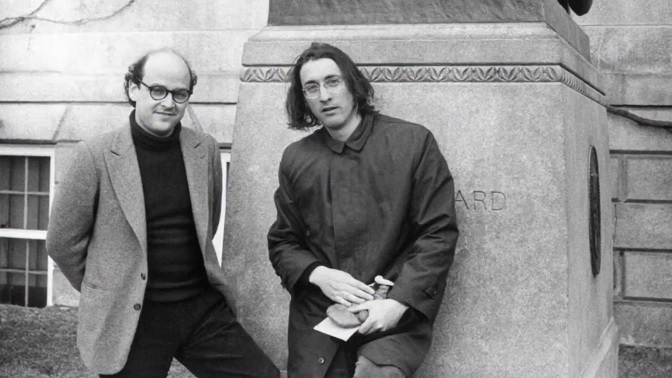
IndieWire, Jul 31, 2003 - Ed Pressman Talks About 30+ Years of Producing
by Matthew RossindieWIRE: How did you get started in filmmaking?
Ed Pressman: I really started during graduate school, when I studied philosophy at the London School of Economics. Before then, I had always loved film, but it had seemed totally remote as a career. In England, I met a young American filmmaker named Paul Williams. He was a very confident, outgoing director who had made a short film at Harvard. After a few days of talking incessantly about movies, we decided to form a partnership. We made a short together, and after that experience, everything else, compared to filmmaking, seemed so limited. At the time we started, film seemed to be a way of changing the world.
Paul was very precocious. He really gave me the confidence to get into the profession. Together he and I made films that Paul directed. The first one was a feature called “Out of It.” It was Jon Voight‘s first film, and John Avildsen was the cameraman. We shot it for about $200,000 at my folks’ summer house in Atlantic Beach, using credit cards and small investments. At the time, that method of making a film without distribution already in place was very, very rare. Cassavetes was doing it and that was about it; the studios really made the movies. But we made the film and sold it to David Picker, who was running United Artists. He then gave us a three-picture deal. We were 21 at the time, and it all seemed so simple. It was a great experience right off the bat. Unfortunately, that film was held back from release because right after United Artists bought it Jon was signed up to star in “Midnight Cowboy,” and they wanted to wait until after that movie was done to get our film some visibility. The next film Paul and I made was “The Revolutionary,” which starred Jon Voigt and Robert Duvall.
iW: How did your partnership with Paul work out?
Pressman: We worked together for about eight years. Paul directed three films, the last of which was “Dealing: Or the Berkeley-to-Boston Forty-Brick Lost-Bag Blues,” based on a book by a young writer named Michael Crichton. Then we started to produce films with other directors. We made “Badlands” with Terrence Malick and “Sisters” and “Phantom of the Paradise” with Brian de Palma. A lot of young filmmakers used to hang out at our office, including Brian and Martin Scorsese, because Paul was really one of the first directors of our generation to make it. Then he went on a spiritual trip. He gave up all his possessions, split up with his wife, and left filmmaking. He’s since come back, and he’s made some interesting low-budget films over the past few years; but it’s hard to get back into the groove after you’ve been gone for so long.
When he went away, he sold his interest in the partnership to me, and I went out on my own. The next time I had a partnership was when I started ContentFilm with John Schmidt two years ago.
Pressman was an integral part of making those films with Williams, and continued that sort of passion with the films he went on to make with De Palma. "Ed's parents had a toy company," De Palma continued, "Pressman Toys, one of whose offices was located at 23rd Street and Broadway. Pressman-Williams had set up its headquarters there. I was working in their offices after the disaster of Get To Know Your Rabbit, and Paul Williams was still a director working at Warner whose film Dealing ended in disaster. Dealing was adapted from the first novel by Michael Crichton. He had written it with his brother Douglas when they were students at Harvard."
Ed Pressman on Mystic & Severe Radio, July 27, 2020
Brian was a friend from New York, and he’d done a film called Greetings, and Hi, Mom!, which were low-budget, very independent movies. And I was a fan and a friend. And Brian then went on to do a studio movie called Get To Know Your Rabbit at Warner Bros. And he had a very unhappy experience. He called me and said, “I’ve got these two projects under option to Warners that I’d do anything to get out.” And, you know, asked if I could find a way to get the properties free. And we were able to do that, and then we had Sisters and Phantom Of The Paradise, and decided, not because of …. [too much occurred? Absurd?] … but because it was simpler to start with Sisters. And we worked with a team of actors and friends who all knew each other from Margot Kidder to Jennifer Salt, Brian and Chuck Durning. So there was an immediate ability to bring it together and do the film for a low budget. And the film opened fairly weakly, but then at that time, there were drive-in theaters. And the drive-in theaters did very substantial business all of a sudden, so it just took on a life that, you know, wouldn’t have existed without the drive-in audience, which was more exploitational.So we did that, and then started to do Phantom Of The Paradise with the same company that distributed Sisters. I remember two weeks before we started to shoot Phantom, they asked to cut the budget by five million dollars, and we couldn’t see a way to do that. So we were fortunate enough to meet an independent financier and Gus Berne and partner Gabe Katzka, who, by a great piece of luck, agreed to come in and take over the financing of the film. So we did it independently, and sold it to Fox after it was made, which at that time was not a common thing.
There were a lot of naysayers, doing the film. I remember the initial line producer, who I had worked with on another film, was let go because he didn’t get along with Terry. And he went back to New York and told my mother, who was really helping me finance the movie, that this film was a mess, and don’t waste your money on this. My gut told me to believe in Terry. And I think that was a good lesson.
Lynn Pressman Raymond was born Lynn Rambach in Woodhaven in 1912. As she grew older, her family moved to Brooklyn where she was a standout at Erasmus Hall High School in Flatbush. As a young woman, she began her career in sales and marketing by rising through the ranks of various stores (including Abraham & Straus) as a publicist.Eventually, her talents caught the attention of James McCreery & Co., a fashionable department store on Fifth Avenue in Manhattan, where she soon found herself in charge of publicity.
But her true calling was the acquisition of toys and games and she found herself drawn to positive and educational products. She also found herself drawn to Jack Pressman, who owned a toy and game company and earned the nickname “The Marble King” because of how many marbles he purchased to supply all the Chinese Checker games that he sold.
In 1942, they married and as vice president of Pressman Toys, Lynn Pressman developed a toy that made a fortune and still sells in stores to this day. She developed the children’s toy doctor bag as a way to ease the fear that children felt when visiting the doctor.
It came with toy versions of doctor’s tools (stethoscope, thermometer and a syringe) and a small bottle of candy pills. The doctor’s bag was a runaway success, leading to variations such as a nurse bag and even versions for Ken and Barbie.
Her husband’s health made it necessary for Lynn Pressman to take an even more active role running Pressman Toys and upon his passing in 1959, she assumed control. She was, at the time, one of the very few women executives running a large company.
This led to issues getting credit, even from the bank her husband had done business with for years, but she eventually secured credit and overcame all obstacles to become one of the more powerful women executives in the United States.
She was a pioneer in licensing the rights to popular television and movie characters for use in creating toys, creating games based on Disney characters along with Superman and the Lone Ranger. She was also known for licensing athletes and creating games using their likenesses on the packaging.
When she took over Pressman Toys, she made one major change to the company policy that undoubtedly impacted the bottom line. Lynn Pressman stated that her company would no longer manufacture, market or sell any toy guns or rifles to children.
Keep in mind that this was the early 1960s and toy guns and rifles were big sellers, but from that moment on, her company followed this principle.
Ms. Pressman, an outspoken opponent of the war in Vietnam, worked together with peace organizations in the late ’60s to encourage other companies to refrain from making “toys that symbolize destruction.”
Through her relationship with UNICEF, she developed a line of Pen Pal Dolls, based on Walt Disney’s Small World attraction at the World’s Fair. Each doll came with a pen and paper and information about the doll’s country.
Later in life, she enjoyed a second career and a bit of enjoyable notoriety through her son, Edward. In fact, Lynn Pressman is listed in the credits as a co-producer of Phantom of the Paradise, directed by Brian De Palma. Lynn Pressman also served as an extra in several of her son’s films.
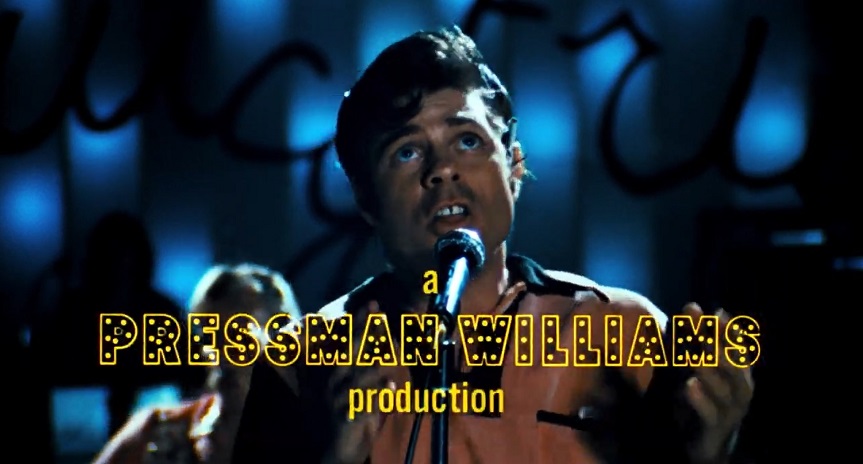
[From the Scream Factory interview with Edward R Pressman (2002)]
Phantom was pretty inclusive. We were financing the film, we were using our family’s toy factory to shoot the film, and we were present throughout the shooting in Dallas and New York. You know, a time I try to enjoy the most, when I’m most involved. It’s easy to be removed and be more of an executive, but at that time I was very integral in the process.A person who is never recognized for her help in making the film was my mother, Lynn Pressman. Because Lynn Pressman ran Pressman Toy Company, my family toy company. And she allowed and encouraged us to use the factory for the prison scene, and the scene in the record pressing plant. There was a moment of terror when the machine seemed to be actually almost crushing Bill’s head… fortunately, it didn’t. But Lynn’s help in letting us use the factory in the prison scene and the record scene, and generally helping us finance the movie, with the help of Gus Berne and Gabe Katzka… If there’s one person who I’ve never really recognized for helping this movie, it was Lynn.
Ironically, after the Warner Brothers release of Badlands, which was a failure, we did re-release the film, maybe six years or eight years later. And we arranged our own distribution in Little Rock, Arkansas, which was the least expensive television market. So we could make ads and promote the film on television with modest means. And then we went to Memphis and did the same thing, and then to Dallas. And once the film was proven in Dallas, then Warner Brothers re-released the film. We had proven that the film could do business. We did the same three-city model with Phantom Of The Paradise, with Brian De Palma’s film, a few years later. And at that time, you could kind of distribute the films yourself.…
After Phantom came out – Sisters, Badlands, Phantom – those films were all, in one way or another successful, either artistically or business-wise, Fox came to us and offered us a deal to pay our overhead and give us a development fund. And so we thought, that’s great, and we took the deal. And that was the most unproductive period of my life, because we worked at a studio and management changed after we made the deal. So the new management was, I think Daryl Zanuck came, and he didn’t want to do any things we wanted to do. So we spent two or three years not making movies. You know, had offices, and had money to develop things, but we weren’t making movies. So after that I decided I’d rather take my chances and stay independent and get the films made, even if it was not as comfortable.
ON AN EARLY SUMMER EVENING IN 1973, Ed Pressman found himself in an apartment on Manhattan's Upper East Side, celebrating the engagement of his thrice-widowed mother, Lynn, to a stockbroker. There he met Gustave Berne, an energetic real estate tycoon in his 70's who had also dabbled in the movie business.Pressman was soon telling Berne about a problem he was having with his sixth movie, ''Phantom of the Paradise,'' a Faustian legend set in the world of rock music. American International Pictures had agreed to finance the project, which Brian De Palma would direct. But A.I.P. had suddenly cut the budget in half. ''I don't know whether they're just squeezing us,'' Pressman said, ''or if Sam Arkoff has changed his mind.''
Berne studied Pressman for a moment. ''I think we can do something, Eddie,'' he said. ''Let's meet tomorrow for lunch.''
Berne checked out the 30-year-old producer and the next day, when Pressman showed up at the Italian Pavilion, Berne boomed out: ''You're O.K., kid. Let's make a deal.''
Pressman's new partner came up with $900,000, the bulk of the ''Phantom'' budget. They estimated the overage - the amount necessary to insure that a movie will be completed even if the budget runs over - at $200,000. That became Pressman's responsibility.
Ed Pressman was an unlikely recruit for the movie business. The son of Jack Pressman, a toy executive known in the 1930's as the Marble King, he appears to have passed smoothly from one play world into another, bringing with him a universe of contacts not often available to those in the film industry.
Pressman's father had died when Ed was 16, and his mother took over the family concern, the third-largest maker of board games in the United States. But Pressman did not want to spend his life dreaming up games for Pressman Toys. As a boy in New York, he worked the refreshment stand at the Lane movie theater, owned by his uncle, Morris Lane. After graduating from Stanford University, he had spent a year at the London School of Economics - but for days hung around the London offices of Columbia Pictures. ''I went into film for the same reason I majored in philosophy,'' he says. ''They are both world-encompassing subjects.''
With $5,000, Pressman bankrolled Paul Williams, another young American abroad, to make a 12-minute short called ''Girl,'' which won a 1966 Golden Eagle Award for nontheatrical films. Back in New York, Pressman confessed to his mother with characteristic understatement why he had overdrawn his bank account: ''Mother, I did this film, and it won an award. And I'd like to go into the movie business.'' In 1969, the novice producer tested his mother's generosity once again when he failed to get studio backing for his first feature-length film, ''Out of It,'' also written by Paul Williams. Lynn Pressman gave her son not only most of the $225,000 he needed but also the run of her summer house on Long Island as a location to shoot the movie. ''I learned to be a producer just by jumping in and doing it,'' says Pressman. ''I was very skeptical about film school. With 'Out of It' I did everything, from the catering on.'' Pressman sold the completed film to United Artists for $250,000. He and Williams then took the check and laid it on Pressman's mother's desk at Pressman Toys.
Over the next five years, the two men made ''The Revolutionary,'' ''Dealing,'' ''Sisters'' and ''Badlands.'' This was the era of ''Easy Rider,'' when studio production heads were willing to take a chance on emerging talent. Williams was the wild-haired young genius while Pressman, prematurely bald, with his calm, deliberate air, seemed older, the stable businessman. Williams eventually stopped making movies, but the early alliances he and Pressman forged with such film writers and directors as Brian De Palma and Oliver Stone were to have lasting importance for Pressman's career. For altogether different reasons, the partnership with Gus Berne also proved a memorable experience. When ''Phantom of the Paradise'' was finished in 1974, 20th Century-Fox bought the film for $2 million. That seemed to assure Pressman and Berne a tidy $800,000 profit. Then Universal enjoined the movie, claiming that ''Phantom of the Paradise'' was a remake of their film ''The Phantom of the Opera.''
''It wasn't. It was a parody,'' says Pressman, ''but we settled the suit out of court, at a cost to Berne and myself of about $350,000."
Most of the films are the work of a single writer-director—the expression of a single vision. As I like to say, the work of John Milius in Conan The Barbarian is as valid in its way as Brian De Palma in Sisters. They’re very different, but they’re all, at least to me, original, cinematically, and somehow tied to the currents of the time.

Phantom of the Paradise might well stand as one of the few horror movies that's simply too unique and weird to ever remake. It tells the story of an up-and-coming musician who's betrayed by a dastardly record producer, and after a period of imprisonment, returns to exact revenge on the man for ruining his life.It was directed by Brian De Palma in the early years of his filmmaking career and still stands as one of his best movies. De Palma has always had a singular style that inevitably leads to visually engaging films, and Phantom of the Paradise is no exception, with its wild and creative visuals effectively complementing the various tones and genres the story covers.
Phantom of the Paradise is one of the greatest cult musicals, combining elements of Phantom of the Opera and Faust (with a dash of Dorian Gray), merging it into a concoction of various musical styles. Of course, rock plays a large part in the proceedings, with some memorably proggy tunes scattered throughout this bleak masterpiece.Directed by Brian De Palma, Phantom is a dark tale with lashings of black humor and a truly depressing ending. It warns of the dangers of selling out and pursuing a life of narcissistic excess, backed up by an endlessly catchy soundtrack. A true classic.
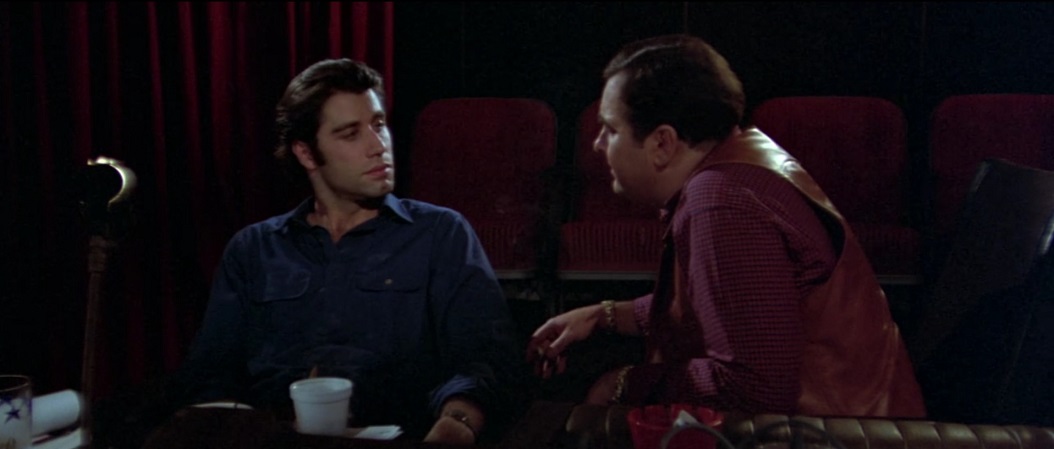
It might be obvious to say, but a film getting nominated for an Oscar doesn’t automatically make it good.In fact, there have been many deserving movies over the years that were somehow overlooked by the Academy.
It’s easy to assume that certain releases don’t get nominated because they’re not what Oscar voters would usually go for, but there have been some surprises in the past.
For example, pretty much every new superhero film earns a nomination thanks to the technical or makeup categories, while random animated films are acknowledged most likely because of the low number on offer in a certain year.
This means films likem say, DC’s Suicide Squad may get mauled by the critics, but they still gain recognition from the Academy (it went on to win).
This is even more ridiculous when you consider that classics such as Don’t Look Now and Blow Out didn’t even get recognised.
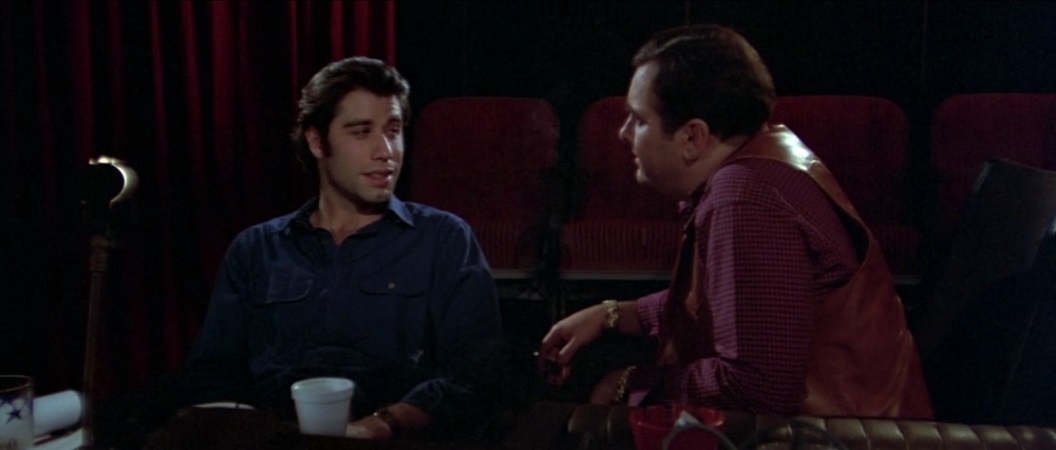

The image above and the image below were both included in @Mag1cH0ur's Twitter post. Note the mention in this 1976 article (below) that one of Ed Pressman's future projects at that time included an adaptation of Alfred Bester's The Demolished Man.
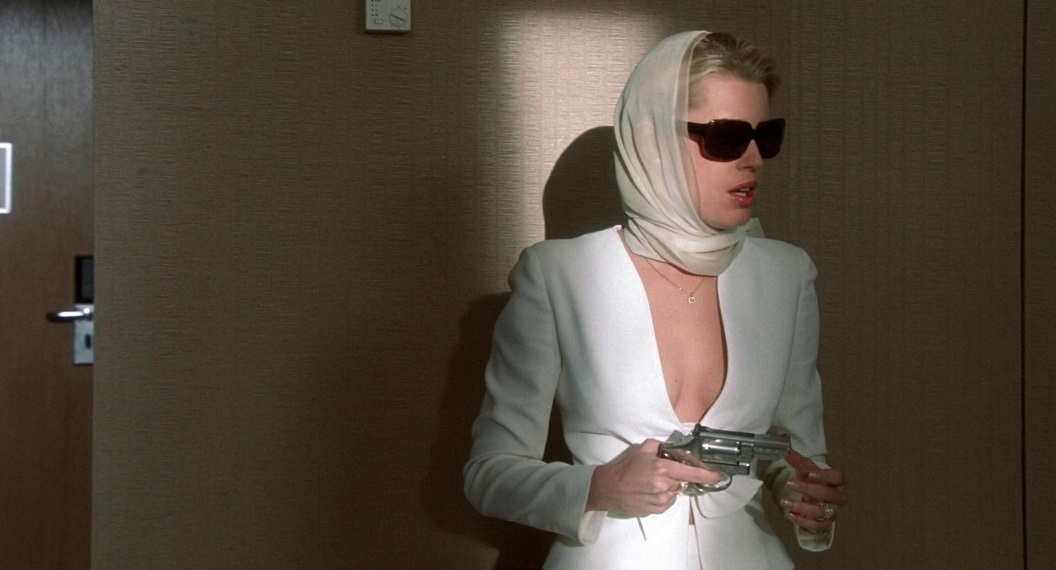
In 1969, De Palma was completing his third feature film, The Wedding Party, and was on his way to becoming a central figure within the New Hollywood. It wasn’t until 1973, with Sisters, that De Palma turned the majority of his creative focus to Hitchcockian riffs on noirish plotlines, in which men, typically, become obsessed with the identity of a woman. Are Snakes Necessary? is in many respects a riff on a riff—it’s De Palma lightly sending up himself and his thematic preoccupations while still piecing together a fully formed thriller storyline. Take Nick Sculley, a thirtysomething photographer, who will play witness to high-level political corruption and, eventually, tragedy. Not only is his name nearly identical to Jake Scully, the protagonist of De Palma’s Body Double, but his circumstances neatly parallel that of Jack (John Travolta) in Blow Out (1981). Other characters will seem familiar to anyone acquainted with De Palma’s films; there’s Fanny Cours, an 18-year-old intern and “political junkie” who is, as De Palma and Lehman write it, “in the full flush of carnality,” and who recalls Liz Blake (Nancy Allen) in Dressed to Kill for how her seductive charm is irresistible to men. Add in a pair of murderous male political figures and a shadowy woman that’s essentially a redux of Rebecca Romijn’s character in De Palma’s Femme Fatale (2002), and the ingredients for pulpy delight are afoot. The novel’s primary drawback, though, is how the economical prose cannot rival De Palma’s audio-visual acumen; in fact, even as prose, one longs for the wilder, stranger metaphors of Elmore Leonard, who has written nearly a dozen novels in a comparable register and with more aplomb.Still, saying Are Snakes Necessary? isn’t up to the level of the crime genre’s maestro shouldn’t suggest it’s inferior within its own contexts. Indeed, as the novel winds toward a close, De Palma and Lehman find a dark and amusing means of quite literally cutting into the heart of the reader’s pent-up desire to see the back cover’s promise of “a female revenge story” fulfilled. It delivers the goods. What’s more engaging from a broader perspective is considering why De Palma and Tarantino have written novels at all. In an interview with the website Crime Reads, De Palma explains that, “As a director I like photographing women more than I like photographing men. As a writer, I like focusing on the woman’s point of view.”1 Though De Palma ends his commentary there, the implication is that prose affords the author the chance to consider perspective in a manner that the director, faced with the immediacy of the moving image, cannot. But for anyone who’s seen De Palma’s films, we should recall that, quite often, scenes unfold from the perspective of women, and often in ways that complicate questions of POV. The opening of Dressed to Kill is the most complex case, in which Kate Miller (Angie Dickinson) masturbates in the shower while looking at a man, presumably her husband, shaving in the mirror. Her sense of pleasure is mirrored, too, by the camera’s scanning of her naked body, which, if we’re talking gazes, is an explicitly erotic and objectifying one, not least because the character’s body is glimpsed in close-up, absent her face (in fact, this is not Dickinson’s body, but a body double). Therefore, we have an instance, sans dialogue, in which the sequencing of images thematize the matter of looking and, to put it another way, seeing. In many ways, the control of the image is tantamount to the entire premise of New Hollywood’s divergence from classical Hollywood’s “genius of the system,” as André Bazin called it. The individual—the auteur—holds the capacity to create, to manipulate, and to puppeteer from outside the frame.
Rick’s solution to aging into obscurity in Once Upon a Time in Hollywood is to work with then-burgeoning auteur Roman Polanski, a prospect that seems imminent by the film’s end. Of course, in hindsight, Polanski’s 1977 sexual-abuse case can’t help but factor into a contemporary conversation about how men, as either directors or writers, are capable of communicating female presence and perspective. Tarantino was criticized during a Cannes press conference for not giving Sharon Tate (Margot Robbie) more screen time in the film; his response in the novelization is almost defiant, as the character is minimized further in favor of expanding Cliff’s background, in particular, into a wife-killing, bloodthirsty cinephile. If that sounds ridiculous, leave it to Tarantino to give his stuntman a knack for cinema, with extended sections on Cliff’s response to I Am Curious (Yellow) (Vilgot Sjöman, 1967) and taste for titles that now comprise the fulcrum for the Criterion Collection’s non-English language selections. There’s also an entire chapter devoted to Cliff’s encounter with Aldo Ray in Spain, in which the stuntman gets the veteran actor drunk. It concludes with Rick chastising him, saying, “When they give you your SAG card at the fuckin’ union office, they give you three rules: One, they gotta give you turnaround. Two, don’t do any nonunion shoots. And three, if you ever do a film with Aldo Ray, under no circumstances give him a bottle.” To what extent one finds this amusing likely depends on one’s tolerance for Tarantino’s own self-indulgent cinephilia, particularly the sort that imagines film-history-as-fan-fiction worthy of entire chapters. Nevertheless, it also cuts to the heart of what’s at stake in both of these novels as it pertains to Tarantino and De Palma: as artists aging into their later years (Tarantino claims he’ll make just one more film), they’re paradoxically intrigued by the question of artistic evolution while also stubbornly resolute in their thematic obsessions and artistic perspectives.
In The Card Counter, Paul Schrader’s latest film, the protagonist, a blackjack sharp who spent eight and a half years in military prison for his role as an Abu Gharib torturer, offers this response to his protégé, who questions if there’s any meaning in the monotony of doing the same thing over and over again: “You just go around and around until you work things out.” Schrader, who wrote the screenplay for De Palma’s Obsession (1976), might as well be speaking through his character in this moment, and in many respects he speaks for De Palma and Tarantino, too: their filmographies suggest slight variations on a theme, explored through repetition. Though Schrader hasn’t written a novel, his films are explorations that spring, in large part, from an early critical work of his own called Transcendental Style in Film: Ozu, Bresson, Dreyer (1972). Like De Palma, nearly fifty years later, the themes remain the same. In writing their first novels, De Palma and Tarantino implicitly ask us to grapple with how time affects our perceptions of ourselves and of the past. Forget snakes; the real question for both of these writer/directors becomes: is change necessary?